Sociology Assignment: Socio-Autobiography of Mother Teresa's Works
VerifiedAdded on 2022/11/03
|6
|1103
|324
Homework Assignment
AI Summary
This socio-autobiography analyzes the life and work of Mother Teresa through a sociological lens, connecting her actions to various social concepts. The paper explores how her work, particularly in Calcutta, India, exemplified concepts such as social class, conformity, role, norms, deviance, and subculture. The student reflects on how Mother Teresa's dedication to helping the impoverished and marginalized aligns with course objectives, emphasizing the importance of individual and group initiatives to address societal problems. The assignment highlights Mother Teresa's disregard for social barriers and her commitment to cross-cultural dialogue, drawing parallels between her actions and contemporary social issues. The student reflects on her influence and how her actions can be an inspiration for the younger generations.
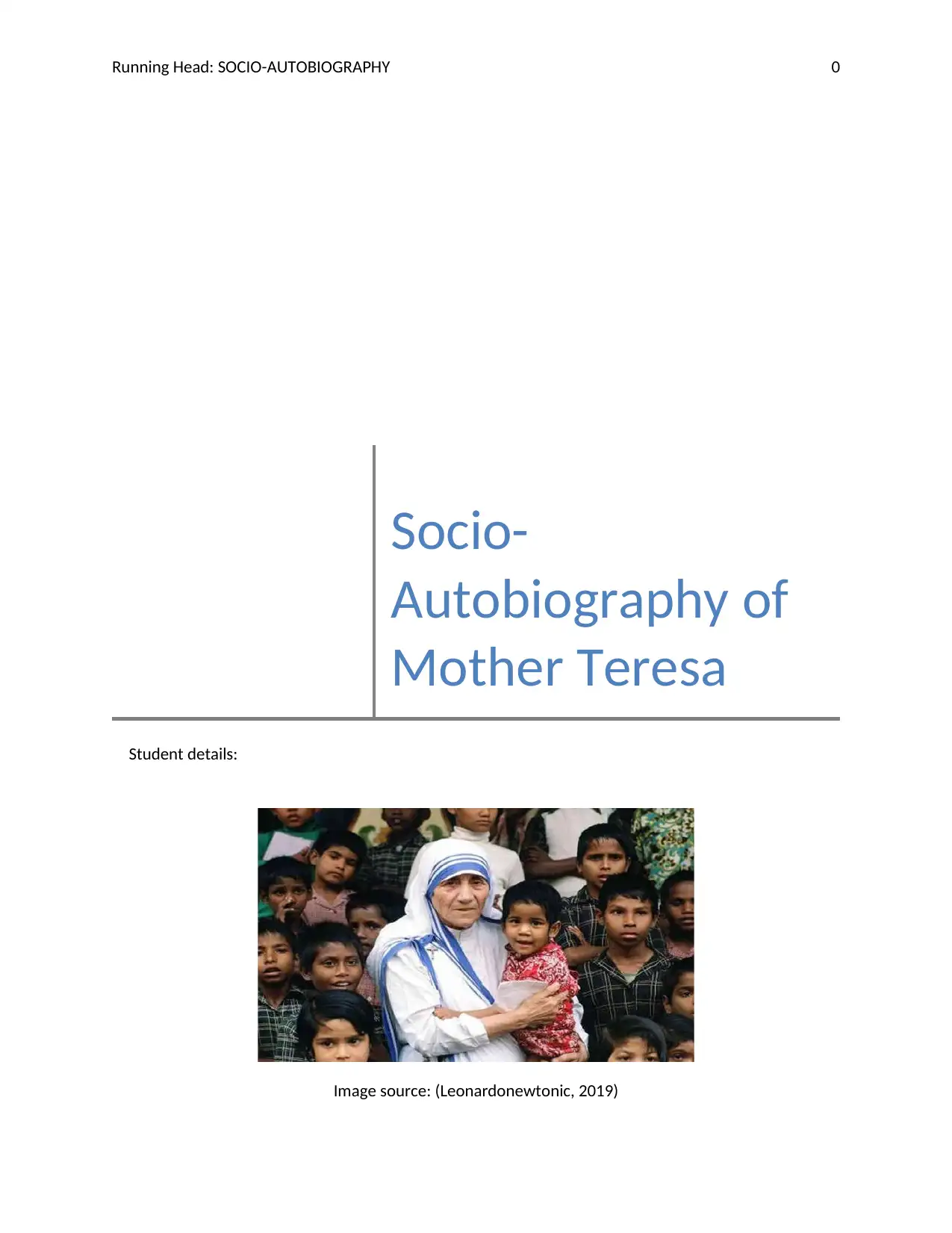
Running Head: SOCIO-AUTOBIOGRAPHY 0
Image source: (Leonardonewtonic, 2019)
Socio-
Autobiography of
Mother Teresa
Student details:
Image source: (Leonardonewtonic, 2019)
Socio-
Autobiography of
Mother Teresa
Student details:
Paraphrase This Document
Need a fresh take? Get an instant paraphrase of this document with our AI Paraphraser
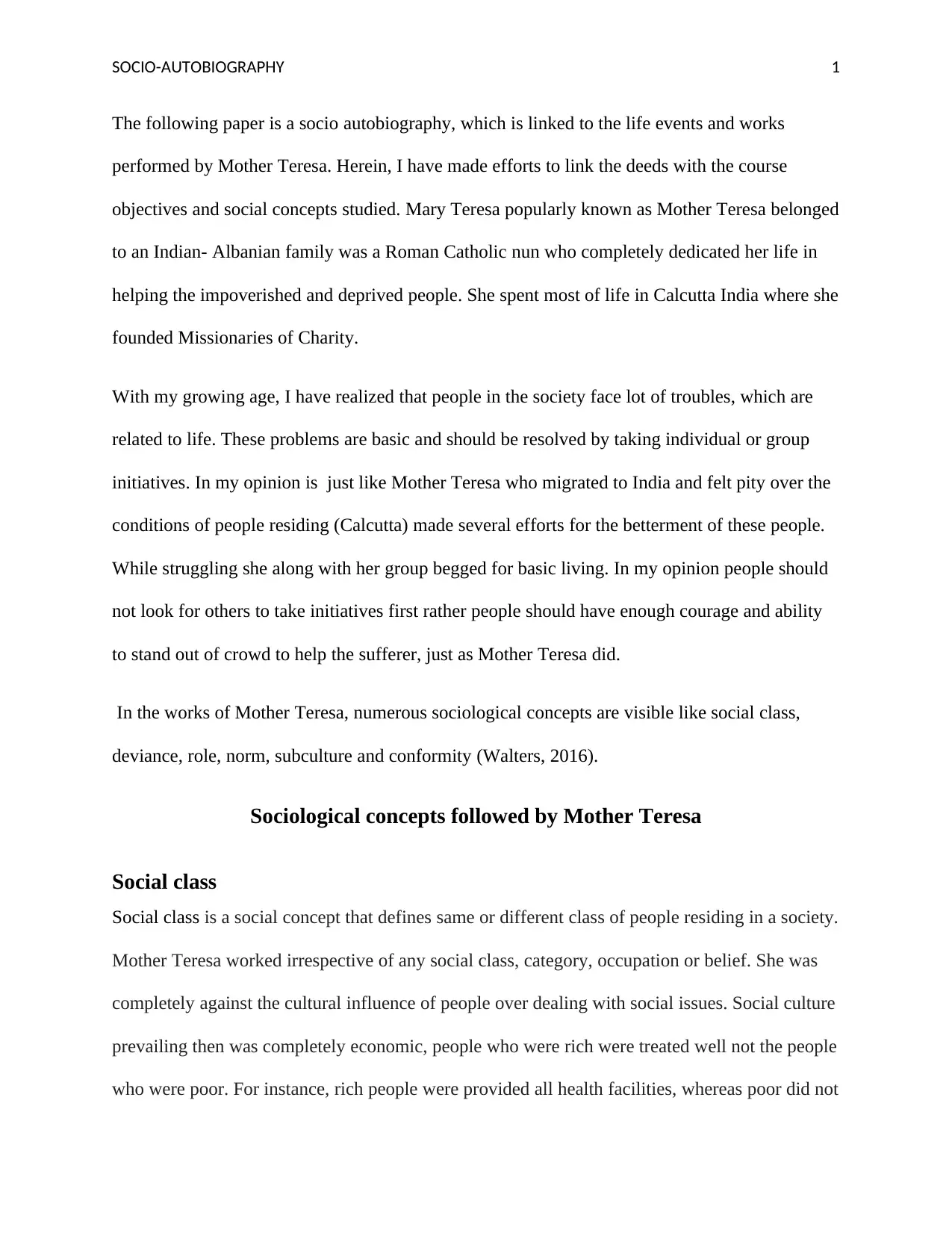
SOCIO-AUTOBIOGRAPHY 1
The following paper is a socio autobiography, which is linked to the life events and works
performed by Mother Teresa. Herein, I have made efforts to link the deeds with the course
objectives and social concepts studied. Mary Teresa popularly known as Mother Teresa belonged
to an Indian- Albanian family was a Roman Catholic nun who completely dedicated her life in
helping the impoverished and deprived people. She spent most of life in Calcutta India where she
founded Missionaries of Charity.
With my growing age, I have realized that people in the society face lot of troubles, which are
related to life. These problems are basic and should be resolved by taking individual or group
initiatives. In my opinion is just like Mother Teresa who migrated to India and felt pity over the
conditions of people residing (Calcutta) made several efforts for the betterment of these people.
While struggling she along with her group begged for basic living. In my opinion people should
not look for others to take initiatives first rather people should have enough courage and ability
to stand out of crowd to help the sufferer, just as Mother Teresa did.
In the works of Mother Teresa, numerous sociological concepts are visible like social class,
deviance, role, norm, subculture and conformity (Walters, 2016).
Sociological concepts followed by Mother Teresa
Social class
Social class is a social concept that defines same or different class of people residing in a society.
Mother Teresa worked irrespective of any social class, category, occupation or belief. She was
completely against the cultural influence of people over dealing with social issues. Social culture
prevailing then was completely economic, people who were rich were treated well not the people
who were poor. For instance, rich people were provided all health facilities, whereas poor did not
The following paper is a socio autobiography, which is linked to the life events and works
performed by Mother Teresa. Herein, I have made efforts to link the deeds with the course
objectives and social concepts studied. Mary Teresa popularly known as Mother Teresa belonged
to an Indian- Albanian family was a Roman Catholic nun who completely dedicated her life in
helping the impoverished and deprived people. She spent most of life in Calcutta India where she
founded Missionaries of Charity.
With my growing age, I have realized that people in the society face lot of troubles, which are
related to life. These problems are basic and should be resolved by taking individual or group
initiatives. In my opinion is just like Mother Teresa who migrated to India and felt pity over the
conditions of people residing (Calcutta) made several efforts for the betterment of these people.
While struggling she along with her group begged for basic living. In my opinion people should
not look for others to take initiatives first rather people should have enough courage and ability
to stand out of crowd to help the sufferer, just as Mother Teresa did.
In the works of Mother Teresa, numerous sociological concepts are visible like social class,
deviance, role, norm, subculture and conformity (Walters, 2016).
Sociological concepts followed by Mother Teresa
Social class
Social class is a social concept that defines same or different class of people residing in a society.
Mother Teresa worked irrespective of any social class, category, occupation or belief. She was
completely against the cultural influence of people over dealing with social issues. Social culture
prevailing then was completely economic, people who were rich were treated well not the people
who were poor. For instance, rich people were provided all health facilities, whereas poor did not
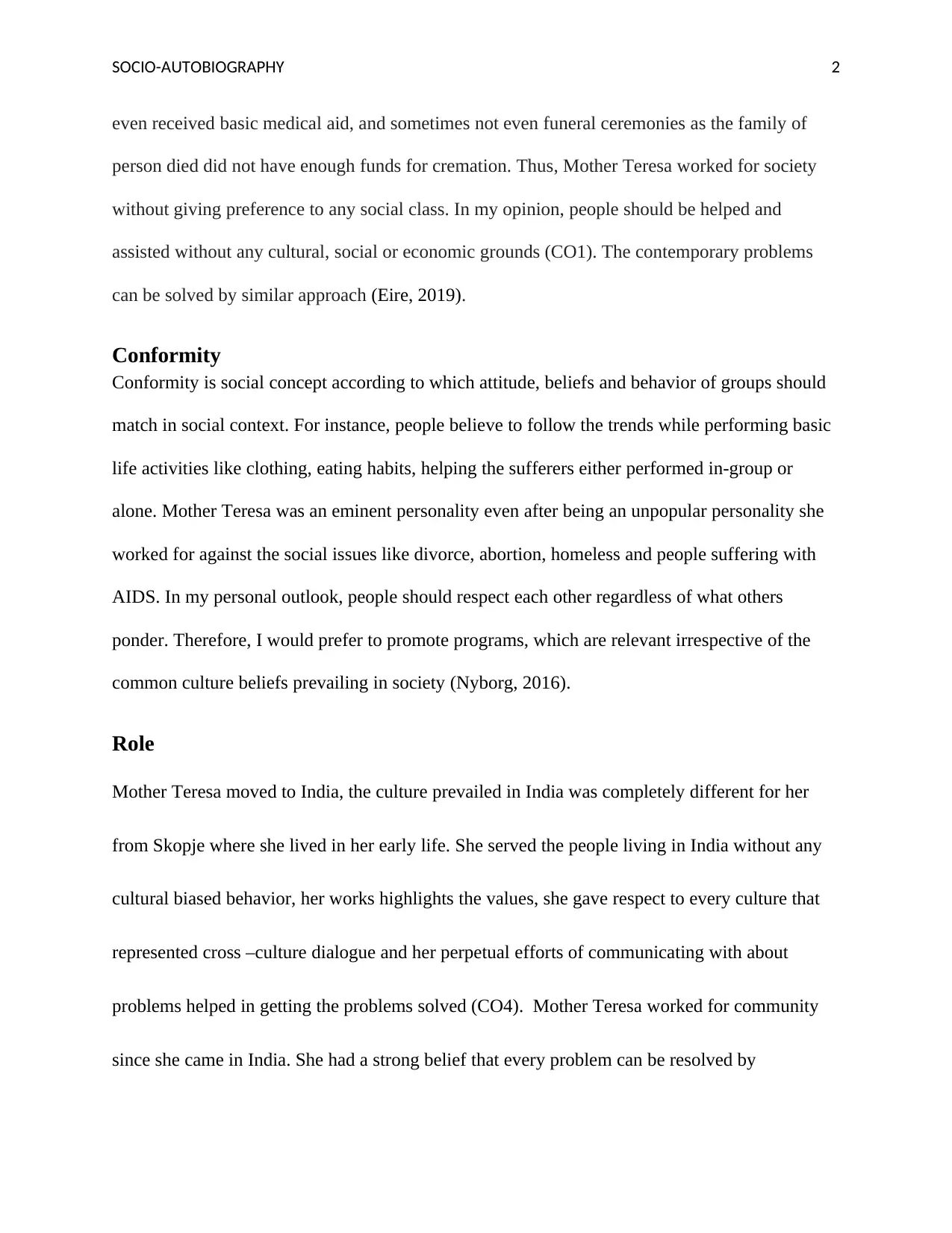
SOCIO-AUTOBIOGRAPHY 2
even received basic medical aid, and sometimes not even funeral ceremonies as the family of
person died did not have enough funds for cremation. Thus, Mother Teresa worked for society
without giving preference to any social class. In my opinion, people should be helped and
assisted without any cultural, social or economic grounds (CO1). The contemporary problems
can be solved by similar approach (Eire, 2019).
Conformity
Conformity is social concept according to which attitude, beliefs and behavior of groups should
match in social context. For instance, people believe to follow the trends while performing basic
life activities like clothing, eating habits, helping the sufferers either performed in-group or
alone. Mother Teresa was an eminent personality even after being an unpopular personality she
worked for against the social issues like divorce, abortion, homeless and people suffering with
AIDS. In my personal outlook, people should respect each other regardless of what others
ponder. Therefore, I would prefer to promote programs, which are relevant irrespective of the
common culture beliefs prevailing in society (Nyborg, 2016).
Role
Mother Teresa moved to India, the culture prevailed in India was completely different for her
from Skopje where she lived in her early life. She served the people living in India without any
cultural biased behavior, her works highlights the values, she gave respect to every culture that
represented cross –culture dialogue and her perpetual efforts of communicating with about
problems helped in getting the problems solved (CO4). Mother Teresa worked for community
since she came in India. She had a strong belief that every problem can be resolved by
even received basic medical aid, and sometimes not even funeral ceremonies as the family of
person died did not have enough funds for cremation. Thus, Mother Teresa worked for society
without giving preference to any social class. In my opinion, people should be helped and
assisted without any cultural, social or economic grounds (CO1). The contemporary problems
can be solved by similar approach (Eire, 2019).
Conformity
Conformity is social concept according to which attitude, beliefs and behavior of groups should
match in social context. For instance, people believe to follow the trends while performing basic
life activities like clothing, eating habits, helping the sufferers either performed in-group or
alone. Mother Teresa was an eminent personality even after being an unpopular personality she
worked for against the social issues like divorce, abortion, homeless and people suffering with
AIDS. In my personal outlook, people should respect each other regardless of what others
ponder. Therefore, I would prefer to promote programs, which are relevant irrespective of the
common culture beliefs prevailing in society (Nyborg, 2016).
Role
Mother Teresa moved to India, the culture prevailed in India was completely different for her
from Skopje where she lived in her early life. She served the people living in India without any
cultural biased behavior, her works highlights the values, she gave respect to every culture that
represented cross –culture dialogue and her perpetual efforts of communicating with about
problems helped in getting the problems solved (CO4). Mother Teresa worked for community
since she came in India. She had a strong belief that every problem can be resolved by
⊘ This is a preview!⊘
Do you want full access?
Subscribe today to unlock all pages.

Trusted by 1+ million students worldwide
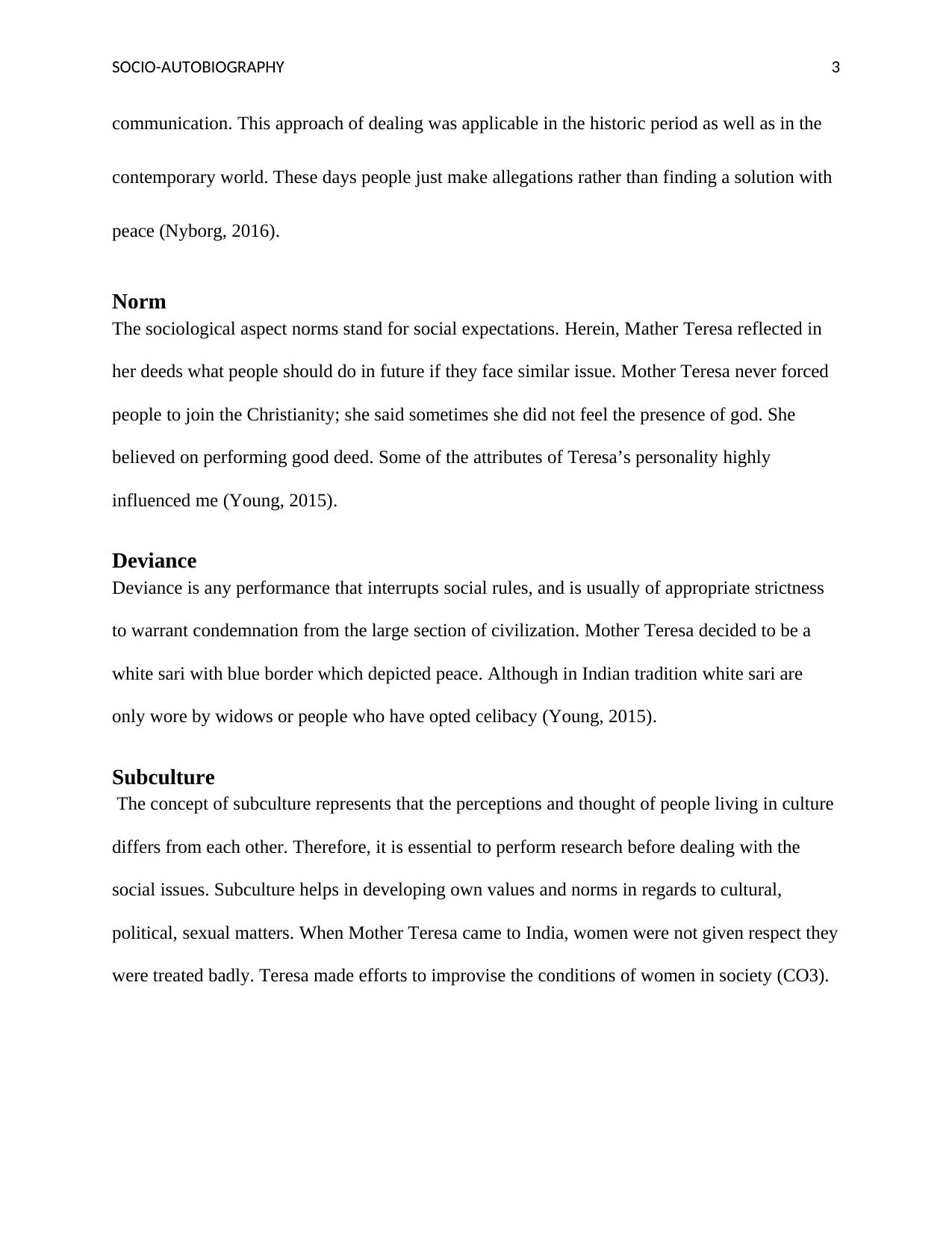
SOCIO-AUTOBIOGRAPHY 3
communication. This approach of dealing was applicable in the historic period as well as in the
contemporary world. These days people just make allegations rather than finding a solution with
peace (Nyborg, 2016).
Norm
The sociological aspect norms stand for social expectations. Herein, Mather Teresa reflected in
her deeds what people should do in future if they face similar issue. Mother Teresa never forced
people to join the Christianity; she said sometimes she did not feel the presence of god. She
believed on performing good deed. Some of the attributes of Teresa’s personality highly
influenced me (Young, 2015).
Deviance
Deviance is any performance that interrupts social rules, and is usually of appropriate strictness
to warrant condemnation from the large section of civilization. Mother Teresa decided to be a
white sari with blue border which depicted peace. Although in Indian tradition white sari are
only wore by widows or people who have opted celibacy (Young, 2015).
Subculture
The concept of subculture represents that the perceptions and thought of people living in culture
differs from each other. Therefore, it is essential to perform research before dealing with the
social issues. Subculture helps in developing own values and norms in regards to cultural,
political, sexual matters. When Mother Teresa came to India, women were not given respect they
were treated badly. Teresa made efforts to improvise the conditions of women in society (CO3).
communication. This approach of dealing was applicable in the historic period as well as in the
contemporary world. These days people just make allegations rather than finding a solution with
peace (Nyborg, 2016).
Norm
The sociological aspect norms stand for social expectations. Herein, Mather Teresa reflected in
her deeds what people should do in future if they face similar issue. Mother Teresa never forced
people to join the Christianity; she said sometimes she did not feel the presence of god. She
believed on performing good deed. Some of the attributes of Teresa’s personality highly
influenced me (Young, 2015).
Deviance
Deviance is any performance that interrupts social rules, and is usually of appropriate strictness
to warrant condemnation from the large section of civilization. Mother Teresa decided to be a
white sari with blue border which depicted peace. Although in Indian tradition white sari are
only wore by widows or people who have opted celibacy (Young, 2015).
Subculture
The concept of subculture represents that the perceptions and thought of people living in culture
differs from each other. Therefore, it is essential to perform research before dealing with the
social issues. Subculture helps in developing own values and norms in regards to cultural,
political, sexual matters. When Mother Teresa came to India, women were not given respect they
were treated badly. Teresa made efforts to improvise the conditions of women in society (CO3).
Paraphrase This Document
Need a fresh take? Get an instant paraphrase of this document with our AI Paraphraser

SOCIO-AUTOBIOGRAPHY 4
According to the teachings and guidance provided by Mother Teresa, I will always work for the
betterment of society irrespective of cast, creed, religion or sex. All men should be equally
treated. Thus, it can be concluded that Mother Teresa is an ideal for the younger generation and
people should follow her sayings.
According to the teachings and guidance provided by Mother Teresa, I will always work for the
betterment of society irrespective of cast, creed, religion or sex. All men should be equally
treated. Thus, it can be concluded that Mother Teresa is an ideal for the younger generation and
people should follow her sayings.
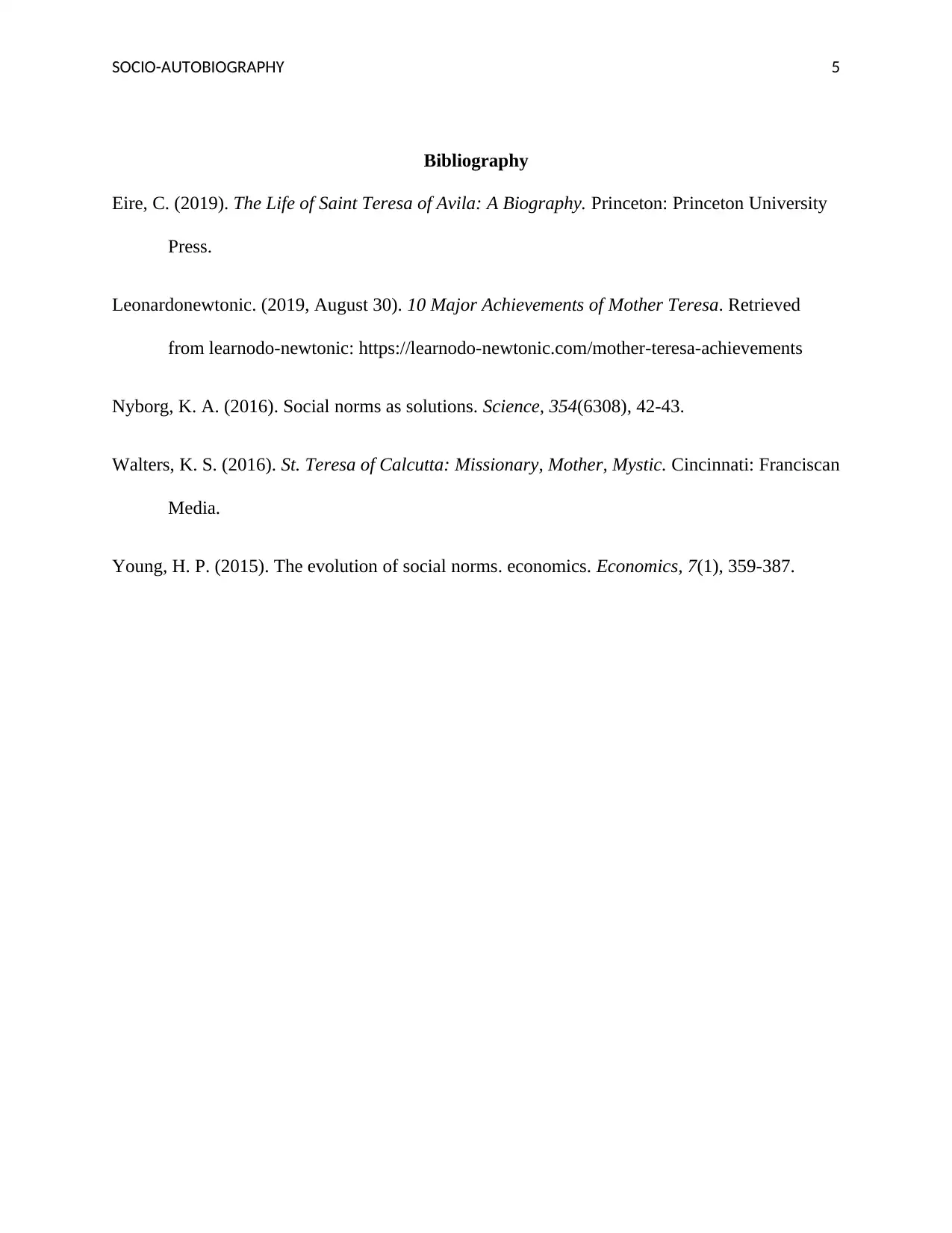
SOCIO-AUTOBIOGRAPHY 5
Bibliography
Eire, C. (2019). The Life of Saint Teresa of Avila: A Biography. Princeton: Princeton University
Press.
Leonardonewtonic. (2019, August 30). 10 Major Achievements of Mother Teresa. Retrieved
from learnodo-newtonic: https://learnodo-newtonic.com/mother-teresa-achievements
Nyborg, K. A. (2016). Social norms as solutions. Science, 354(6308), 42-43.
Walters, K. S. (2016). St. Teresa of Calcutta: Missionary, Mother, Mystic. Cincinnati: Franciscan
Media.
Young, H. P. (2015). The evolution of social norms. economics. Economics, 7(1), 359-387.
Bibliography
Eire, C. (2019). The Life of Saint Teresa of Avila: A Biography. Princeton: Princeton University
Press.
Leonardonewtonic. (2019, August 30). 10 Major Achievements of Mother Teresa. Retrieved
from learnodo-newtonic: https://learnodo-newtonic.com/mother-teresa-achievements
Nyborg, K. A. (2016). Social norms as solutions. Science, 354(6308), 42-43.
Walters, K. S. (2016). St. Teresa of Calcutta: Missionary, Mother, Mystic. Cincinnati: Franciscan
Media.
Young, H. P. (2015). The evolution of social norms. economics. Economics, 7(1), 359-387.
⊘ This is a preview!⊘
Do you want full access?
Subscribe today to unlock all pages.

Trusted by 1+ million students worldwide
1 out of 6
Related Documents
Your All-in-One AI-Powered Toolkit for Academic Success.
+13062052269
info@desklib.com
Available 24*7 on WhatsApp / Email
![[object Object]](/_next/static/media/star-bottom.7253800d.svg)
Unlock your academic potential
Copyright © 2020–2026 A2Z Services. All Rights Reserved. Developed and managed by ZUCOL.



![Sociology Essay: Personal Philosophy of Helping - [University Name]](/_next/image/?url=https%3A%2F%2Fdesklib.com%2Fmedia%2Fimages%2Fvx%2F3ba7ccef4771443fb7a13949d6b0e9ab.jpg&w=256&q=75)

